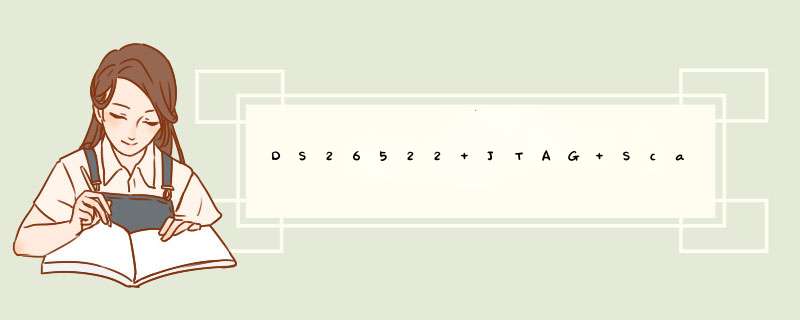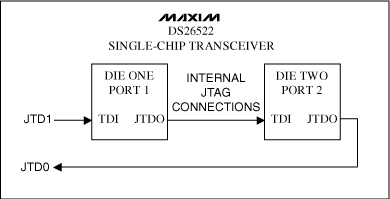
Abstract: This
applica
TIon no
te describes the JTAG hardware boundary s
can ch
ain for the
DS26522 dual-port, single-chip transceiver. The DS26522 is composed of two dice, and the JTAG funcTIonality is the same as two separate devices daisy chained together. This applicaTIon note contains a complete breakdown of the JTAG scan chain and explains how to access all of the scan cells in the boundary.
OverviewThis applicaTIon note describes the JTAG hardware boundary scan chain for the DS26522 dual-port T1/E1/J1 single-chip transceiver (SCT). It is a dual-die module with two separate JTAG controlle
rs in the same package (see Figure 1). Notice the internal JTAG connections. The JTDI
pin is connected to the JTDI input of the first die (port 1), while the JTDO pin is connected to the JTDO output of the second die (port 2). JTRST, JTCLK, and JTMS are wired together in parallel to both ports. This causes the DS26522 to appear as two separate devices in any JTAG software application. To solve this issue, two BSDL files have been created: one for port 1 and one for port 2.

Figure 1. DS26522 JTAG Scan Chain
If the user would like to do any type of JTAG testing that requires a board netlist, the netlist will need to be modified to ensure that there are two unique instances of the DS26522 that correspond to the two BSDL files. Table 1 contains the port location (SCT port), the pin names, BSDL cell scan position, BSDL cell name and other useful information that correspond to the pins in each BSDL file. The table has been sorted by port location (SCT number) and then BSDL cell scan position. This should allow easy access to the necessary information about which BSDL cell scan position maps to which port location and
BGA pin number. Incomplete or incorrect JTAG testing can be caused by the failure to modify the netlist accordingly.
Table 1. DS26522 JTAG scan chain: BGA pin to BSDL cell mapping
SCT Port
BGA Pin
BSDL Scan Position
BSDL Scan Name
BSDL Scan Function
Data Sheet Symbol
Data Sheet Description
1
F8
0
TSER
Observe_only
TSER1
Transmit NRZ Serial Data
1
G8
1
TCLK
Observe_only
TCLK1
Transmit Clock
1
H8
2
TSYSCLK
Observe_only
TSYSCLK1
Transmit System Clock
1
--
3
--
Control
--
--
1
J7
4
TSYNC
Output3
TSYNC1
Transmit Synchronization
1
--
5
TSYNC
Observe_only
--
--
1
--
6
--
Control
--
--
1
G7
7
TSSYNCIO
Output3
TSSYNCIO1
Transmit System Synchronization In or Out
1
--
8
TSSYNCIO
Observe_only
--
--
1
--
9
--
Control
--
--
1
H7
10
TSIG
Output3
TSIG1
Transmit Signaling
1
--
11
TSIG
Observe_only
--
--
1
--
12
--
Control
--
--
1
F7
13
TCHBLK_CLK
Output3
TCHBLK/CLK1
Transmit Channel Block or Transmit Channel Block Clock
1
--
14
TCHBLK_CLK
Observe_only
--
--
1
--
15
--
Control
--
--
1
K5
16
RSER
Output3
RSER1
Received Serial Data
1
--
17
--
Control
--
--
1
L8
18
RCLK
Output3
RCLK1
Receive Clock
1
--
19
RCLK
Observe_only
--
--
1
J8
20
RSYSCLK
Observe_only
RSYSCLK1
Receive System Clock
1
--
21
--
Control
--
--
1
K7
22
RYSNC
Output3
RSYNC1
Receive Synchronization
1
--
23
RYSNC
Observe_only
--
--
1
--
24
--
Control
--
--
1
G6
25
RM_RFSYNC
Output3
RM/RFSYNC1
Receive Multiframe or Frame Synchronization
1
--
26
RM_RFSYNC
Observe_only
--
--
1
--
27
--
Control
--
--
1
H6
28
RSIG
Output3
RSIG1
Receive Signaling
1
--
29
RSIG
Observe_only
--
--
1
--
30
--
Control
--
--
1
F6
31
AL_RSIGF_FLOS
Output3
AL/RSIGF/FLOS1
Analog Loss or Receive Signaling Freeze or Framer LOS
1
--
32
--
Control
--
--
1
J5
33
RLF_LTC
Output3
RLF/LTC1
Receive Loss of Frame or Loss of Transmit Clock
1
--
34
--
Control
--
--
1
J6
35
RCHBLK_CLK
Output3
RCHBLK/CLK1
Receive Channel Block or Receive Channel Block Clock
1
--
36
RCHBLK_CLK
Observe_only
--
--
1
--
37
--
Control
--
--
1
K6
38
BPCLK
Output3
BPCLK1
Backplane Clock
1
--
39
--
Control
--
--
1
K8
40
REFCLKIO
Output3
REFCLKIO1
Reference Clock Input or Output
1
--
41
REFCLKIO
Observe_only
--
--
1
M9
42
MCLK
Observe_only
MCLK
Master Clock
1
K3
43
RESETB
Observe_only
RESETB
Reset Bar
1
--
44
--
Control
--
--
1
K4
45
INTB
Output3
INTB
Interrupt Bar
1
J3
46
WRB_RWB
Observe_only
WRB/RWB
Write Bar or Read-Write Bar
1
H3
47
RDB_DSB
Observe_only
RDB/DSB
Read Data Bar or Strobe Bar
1
L4
48
CSB
Observe_only
CSB1
Chip Select Bar
1
--
49
--
Control
--
--
1
M3
50
D0
Output3
D0/SPI_MISO
Data[0] or SPI Serial Interface Data Master-In Slave-Out
1
--
51
D0
Observe_only
--
--
1
--
52
--
Control
--
--
1
L3
53
D1
Output3
D1/SPI_MOSI
Data[1] or SPI Serial Interface Data Master-Out Slave-In
1
--
54
D1
Observe_only
--
--
1
--
55
--
Control
--
--
1
M2
56
D2
Output3
D[2]/SPI_SCLK
Data[2] or SPI Serial Interface Clock
1
--
57
D2
Observe_only
--
--
1
--
58
--
Control
--
--
1
M1
59
D3
Output3
D[3]
Data[3]
1
--
60
D3
Observe_only
--
--
1
--
61
--
Control
--
--
1
L2
62
D4
Output3
D[4]
Data[4]
1
--
63
D4
Observe_only
--
--
1
--
64
--
Control
--
--
1
L1
65
D5
Output3
D[5]/SPI_SWAP
Data[5] or SPI Bit Order Swap
1
--
66
D5
Observe_only
--
--
1
--
67
--
Control
--
--
1
K2
68
D6
Output3
D[6]/SPI_CPHA
Data[6] or SPI Interface Clock Phase
1
--
69
D6
Observe_only
--
--
1
--
70
--
Control
--
--
1
K1
71
D7
Output3
D[7]/SPI_CPOL
Data[7] or SPI Interface Clock Polarity
1
--
72
D7
Observe_only
--
--
1
J2
73
A0
Observe_only
A0
Address[0]
1
J1
74
A1
Observe_only
A1
Address[1]
1
H2
75
A2
Observe_only
A2
Address[2]
1
H1
76
A3
Observe_only
A3
Address[3]
1
G2
77
A4
Observe_only
A4
Address[4]
1
G1
78
A5
Observe_only
A5
Address[5]
1
F2
79
A6
Observe_only
A6
Address[6]
1
F1
80
A7
Observe_only
A7
Address[7]
1
E2
81
A8
Observe_only
A8
Address[8]
1
E1
82
A12
Observe_only
A12
Address[12]
1
E6
83
TXEN_B
Observe_only
TXENABLE1
Transmit Enable
1
E5
84
BTS
Observe_only
BTS
Bus Type Select
1
D7
85
SPI_SEL
Observe_only
SPI_SEL
SPI Serial Bus Mode Select
2
E12
0
TSER
Observe_only
TSER2
Transmit NRZ Serial Data
2
G11
1
TCLK
Observe_only
TCLK2
Transmit Clock
2
H11
2
TSYSCLK
Observe_only
TSYSCLK2
Transmit System Clock
2
--
3
--
Control
--
--
2
F11
4
TSYNC
Output3
TSYNC2
Transmit Synchronization
2
--
5
TSYNC
Observe_only
--
--
2
--
6
--
Control
--
--
2
F12
7
TSSYNCIO
Output3
TSSYNCIO2
Transmit System Synchronization In/Out
2
--
8
TSSYNCIO
Observe_only
--
--
2
--
9
--
Control
--
--
2
E11
10
TSIG
Output3
TSIG2
Transmit Signaling
2
--
11
TSIG
Observe_only
--
--
2
--
12
--
Control
--
--
2
G12
13
TCHBLK_CLK
Output3
TCHBLK/CLK2
Transmit Channel Block or Transmit Channel Block Clock
2
--
14
TCHBLK_CLK
Observe_only
--
--
2
--
15
--
Control
--
--
2
H12
16
RSER
Output3
RSER2
Received Serial Data
2
--
17
--
Control
--
--
2
L9
18
RCLK
Output3
RCLK2
Receive Clock
2
--
19
RCLK
Observe_only
--
--
2
J11
20
RSYSCLK
Observe_only
RSYSCLK2
Receive System Clock
2
--
21
--
Control
--
--
2
K12
22
RYSNC
Output3
RSYNC2
Receive Synchronization
2
--
23
RYSNC
Observe_only
--
--
2
--
24
--
Control
--
--
2
L12
25
RM_RFSYNC
Output3
RM/RFSYNC2
Receive Multiframe or Frame Synchronization
2
--
26
RM_RFSYNC
Observe_only
--
--
2
--
27
--
Control
--
--
2
L11
28
RSIG
Output3
RSIG2
Receive Signaling
2
--
29
RSIG
Observe_only
--
--
2
--
30
--
Control
--
--
2
J12
31
AL_RSIGF_FLOS
Output3
AL/RSIGF/FLOS2
Analog Loss or Receive Signaling Freeze or Framer LOS
2
--
32
--
Control
--
--
2
M12
33
RLF_LTC
Output3
RLF/LTC2
Receive Loss of Frame or Loss of Transmit Clock
2
--
34
--
Control
--
--
2
M11
35
RCHBLK_CLK
Output3
RCHBLK/CLK2
Receive Channel Block or Receive Channel Block Clock
2
--
36
RCHBLK_CLK
Observe_only
--
--
2
--
37
--
Control
--
--
2
M10
38
BPCLK
Output3
BPCLK2
Backplane Clock
2
--
39
--
Control
--
--
2
L10
40
REFCLKIO
Output3
REFCLKIO2
Reference Clock Input or Output
2
--
41
REFCLKIO
Observe_only
--
--
2
M9
42
MCLK
Observe_only
MCLK
Master Clock
2
K3
43
RESETB
Observe_only
RESETB
Reset Bar
2
--
44
--
Control
--
--
2
K4
45
INTB
Output3
INTB
Interrupt Bar
2
J3
46
WRB_RWB
Observe_only
WRB/RWB
Write Bar or Read-Write Bar
2
H3
47
RDB_DSB
Observe_only
RDB/DSB
Read Data Bar or Strobe Bar
2
M4
48
CSB
Observe_only
CSB2
Chip Select Bar
2
--
49
--
Control
--
--
2
M3
50
D0
Output3
D[0]/SPI_MISO
Data[0] or SPI Serial Interface Data Master-In Slave-Out
2
--
51
D0
Observe_only
--
--
2
--
52
--
Control
--
--
2
L3
53
D1
Output3
D[1]/SPI_MOSI
Data[1] or SPI Serial Interface Data Master-Out Slave-In
2
--
54
D1
Observe_only
--
--
2
--
55
--
Control
--
--
2
M2
56
D2
Output3
D[2]/SPI_SCLK
Data[2] or SPI Serial Interface Clock
2
--
57
D2
Observe_only
--
--
2
--
58
--
Control
--
--
2
M1
59
D3
Output3
D[3]
Data[3]
2
--
60
D3
Observe_only
--
--
2
--
61
--
Control
--
--
2
L2
62
D4
Output3
D[4]
Data[4]
2
--
63
D4
Observe_only
--
--
2
--
64
--
Control
--
--
2
L1
65
D5
Output3
D[5]/SPI_SWAP
Data[5] or SPI Bit Order Swap
2
--
66
D5
Observe_only
--
--
2
--
67
--
Control
--
--
2
K2
68
D6
Output3
D[6]/SPI_CPHA
Data[6] or SPI Interface Clock Phase
2
--
69
D6
Observe_only
--
--
2
--
70
--
Control
--
--
2
K1
71
D7
Output3
D[7]/SPI_CPOL
Data[7] or SPI Interface Clock Polarity
2
--
72
D7
Observe_only
--
--
2
J2
73
A0
Observe_only
A0
Address[0]
2
J1
74
A1
Observe_only
A1
Address[2]
2
H2
75
A2
Observe_only
A2
Address[2]
2
H1
76
A3
Observe_only
A3
Address[3]
2
G2
77
A4
Observe_only
A4
Address[4]
2
G1
78
A5
Observe_only
A5
Address[5]
2
F2
79
A6
Observe_only
A6
Address[6]
2
F1
80
A7
Observe_only
A7
Address[7]
2
E2
81
A8
Observe_only
A8
Address[8]
2
E1
82
A12
Observe_only
A12
Address[12]
2
E7
83
TXEN_B
Observe_only
TXENABLE2
Transmit Enable
2
E5
84
BTS
Observe_only
BTS
Bus Type Select
2
D7
85
SPI_SEL
Observe_only
SPI_SEL
SPI Serial Bus Mode Select
ConclusionThis application note explains in detail about the JTAG hardware boundary scan chain for the DS26522 (SCT). The DS26522 is composed of two die and the JTAG functionality is the same as two separate devices daisy chained together. The application note also contains a complete breakdown of the JTAG scan chain and explains how to access all of the boundary scan cells in the device.
If you have further questions about the DS26522 or our Telecom products at Maxim, please contact the Telecommunication Applications support team through email at
Telecom.Support@maxim-ic.com or call 972-371-6555.



 微信扫一扫
微信扫一扫
 支付宝扫一扫
支付宝扫一扫
评论列表(0条)